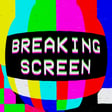
Yolanda Ramke's writing process and advice for emerging creatives
Award-winning screenwriter and director Yolanda Ramke joins this 'mini-break' episode of Breaking Screen - a shorter episode than usual - to talk about her methodical approach to writing Australian television and advice for writers and directors trying to get a foot in the industry.
Yolanda first found success when she wrote, and co-directed the 2013 viral short film Cargo with frequent collaborator Ben Howling. Yolanda and Ben then expanded Cargo into their feature film debut of the same name, which was produced by Causeway Films, starred Martin Freeman, and was the first Australian Netflix Original narrative feature film. The pair also co-directed two episodes of the Netflix series The Haunting Of Bly Manor, created by Mike Flanagan. And in recent years Yolanda was creator, executive producer, a writer and co-director on the ABC series Troppo (which also had a second season in 2024) and she has slate of feature film and TV projects in development.
